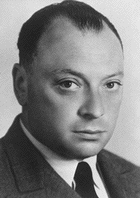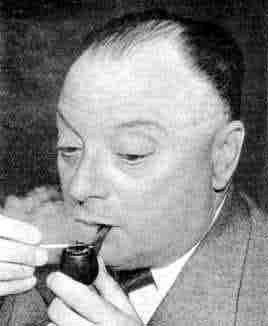Wolfgang Pauli
Wolfgang
Pauli und die moderne Physik
Ausstellung der ETH-Bibliothek aus Anlass des 100. Geburtstags
von Wolfgang Pauli.
http://www.ethbib.ethz.ch/exhibit/pauli/pauli.html
Wolfgang Pauli -The Nobel Prize in
Physics 1945
 Pauli
(1900-1958) was outstanding among the brilliant
mid-twentieth century school of physicists. He
was recognized as one of the leaders when, barely
out of his teens and still a student, he
published a masterly exposition of the theory of
relativity. His exclusion principle, which is
often quoted bearing his name, crystallized the
existing knowledge of atomic structure at the
time it was postulated and it led to the
recognition of the two-valued variable required
to characterize the state of an electron. Pauli
was the first to recognize the existence of the
neutrino, an uncharged and massless particle
which carries off energy in radioactive
ß-disintegration; this came at the beginning of
a great decade, prior to World War I I, for his
centre of research in theoretical physics at
Zurich. Pauli
(1900-1958) was outstanding among the brilliant
mid-twentieth century school of physicists. He
was recognized as one of the leaders when, barely
out of his teens and still a student, he
published a masterly exposition of the theory of
relativity. His exclusion principle, which is
often quoted bearing his name, crystallized the
existing knowledge of atomic structure at the
time it was postulated and it led to the
recognition of the two-valued variable required
to characterize the state of an electron. Pauli
was the first to recognize the existence of the
neutrino, an uncharged and massless particle
which carries off energy in radioactive
ß-disintegration; this came at the beginning of
a great decade, prior to World War I I, for his
centre of research in theoretical physics at
Zurich.
http://www.nobel.se/laureates/physics-1945.html
Wolfgang Pauli
Wolfgang Pauli wurde am 25.April
1900 in Wien geboren und starb am 15.Dezember
1958 in Zürich. Pauli gehörte zu den großen
Physikern des 20.Jahrhunderts. An den wichtigen
Entwicklungen zu seinen Lebzeiten, der Quantenmechanik,
der Kernphysik, der modernen
Feldtheorie und der Teilchenphysik,
hatte er wesentlichen Anteil. Hinter seiner
Sachlichkeit verbarg sich allerdings auch ein
tiefes Interesse an philosophischen und letzlich
menschlichen Problemen, über die er z.T.
ausgedehnte Diskussionen mit dem Psychologen Carl
Gustav Jung führte.
http://www.chemie.uni-bremen.de/stohrer/biograph/pauli.htm
![[Wolfgang Pauli]](../../../../bilder/pauli.jpg) Wolfgang
Pauli (1900-1958) Wolfgang
Pauli (1900-1958)
Über Paulis Kindheit und Jugend weiß man sehr wenig. Pauli
selbst ist in seinen Briefen nur selten auf seine
Entwicklungsjahre eingegangen. Sein Vater Wolfgang Josef Pauli
beendete sein Medizinstudium 1892 in Prag und übersiedelte 1898
nach Wien. Dort heiratete er 1899 Berta Schütz. Nach der
4.Volkschulklasse kam Wolfgang Pauli in das k.k. Gymnasium in Döbling.
Im Gegensatz zu seinem Klassenkameraden Richard Kuhn war Pauli
keineswegs ein Musterschüler. Seine anfangs sehr guten Zensuren
waren gegen Ende seiner Schullaufbahn nur genügend. Am 2.Juli
1918 maturierte er "mit Auszeichnung". Doch von
entscheidenderer Bedeutung für Paulis wissenschaftliche
Entfaltung dürften die Anregungen seines Vaters gewesen sein.
Aber auch seine Begabung bei den Fächern Mathematik und Physik
blieb nicht unentdeckt.
http://www.cso.net/bg19/beta/pauli.htm
Wolfgang Pauli: short biography &
some quotes
Pauli was born in Vienna, April
25th, 1900. His father was a physician of jewish
descent, who became professor at university in
Vienna. Pauli was baptized in the Catholic
church. His godfather was the physicist Ernst
Mach. According to a letter of Pauli, his
godfather was much stronger a personality as the
priest, with the result that his baptism had not
a catholic, but rather an antimetaphysical
character.
 When he was
21, he finished an excellent summary of
Einstein's relativity theories for the
'Encyklopaedie der mathematischen
Wissenschaften'. In 1924 Pauli formulated the
exclusion principle, his first major discovery in
atomic physics. Pauli played an important role in
the development of quantum mechanics, that
occurred from 1924 to 1927. In 1932, Pauli
proposed the existence of the 'neutrino', to
explain beta-decay in Radium. At the end of his
life (1956), this particle was detected
experimentally. When he was
21, he finished an excellent summary of
Einstein's relativity theories for the
'Encyklopaedie der mathematischen
Wissenschaften'. In 1924 Pauli formulated the
exclusion principle, his first major discovery in
atomic physics. Pauli played an important role in
the development of quantum mechanics, that
occurred from 1924 to 1927. In 1932, Pauli
proposed the existence of the 'neutrino', to
explain beta-decay in Radium. At the end of his
life (1956), this particle was detected
experimentally.
After the psychoanalytical treatment, Pauli
remained in contact with Jung . In 1952, they
coauthored a book 'Naturerklaerung und Psyche',
that contains Pauli's study on Kepler and the
influence of archetypes on Kepler's theories.
He died in December 15th, 1958.
I consider Pauli as one of the most
important thinkers of our time. As a
matter of fact, he had developed to a certain
degree the art of perceiving the depths of
reality in an immediate, imaginative
way. For instance, his Easter dream about
the four eggs, is an imaginative representation
of the four causes, the same concept that had
been captured in an abstract way by Aristotle.
This is an example of Pauli's concept of 'archetype':
the archetype permits us to understand reality;
but at the same time, the archetype also operates
in the depths of substance. Pauli situated the
archetypes in a 'Zwischenreich', the realm of the
soul , that mediates between the realm of matter
and the realm of spirit. Of course, most
scientists will tend to denigrate these opinions
and guesses of Pauli, but I believe that in his
'dark' writings and letters importants germs are
hidden for future scientific development.
"Das Ziel der Wissenschaft
und des Lebens wird (...)letzten Endes der Mensch
bleiben" (Letter to Jung, 27-2-1953)
"Wir duerfen nicht die Atome
in die Fesseln unserer Vorurteile schlagen wollen
(zu denen nach meiner Meinung auch die Annahme
der Existenz von Elektronenbahnen im Sinne der
gewöhnlichen Kinematik gehoert), sondern wir
muessen umgekehrt unsere Begriffe der Erfahrung
anpassen" (Letter to Bohr, December 12,
1924)
http://www.ping.be/jvwit/WPaulishortbioquotes.html
|



